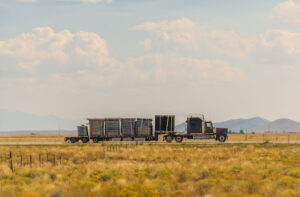Denver Truck Accident Lawyer

Have you or a loved one been injured in a truck accident in Denver, CO? At Zaner Law Personal Injury Lawyers, we are extremely familiar with these accidents and can help you secure the justice and compensation that you and your family deserve. Contact us at (720) 613-9706 to schedule a free, no-obligation consultation with a Denver truck accident attorney.
Zaner Law Personal Injury Lawyers handles all Denver personal injury cases and has years of experience representing clients for cases involving car accidents, Denver motorcycle injuries, slip and fall cases, wrongful death claims, brain injury cases, and more.
What to do after being in a collision witha semi-truck in Denver, CO

Being involved in an 18-wheeler accident can be extremely overwhelming, especially if you are injured. Still, it is vital that you know what is most important in the hours, days, and weeks, after your crash. Here are the steps of what you should do after a truck accident.
1. See a doctor as soon as possible
Caring for your health is more important than anything else: if you are not taken to the hospital via ambulance, be sure to get examined at the scene of the crash and schedule an appointment with your primary care physician. Be aware that some injuries may be covered by adrenaline and others may take time to surface, such as traumatic brain injuries.
2. Collect all possible evidence
We understand that you are probably not healthy enough to sleuth around the wreckage and solve the mystery of what happened, but even if you can take down witness names and snap a few pictures with your phone, you could hold on to evidence that will help you win your truck accident injury case down the road.
3. Don’t bend under pressure
Truck companies are very, very familiar with fighting accident and injury claims. One tactic they will use, along with the insurance companies, is to convince you to make a recorded statement without an attorney or to settle for much less than your case is worth. Don’t do either.
4. Contact a tractor-trailer accident attorney
When it comes to these cases, our truck accident attorneys have just as much experience as the truck companies and we can level the playing field. Schedule a consultation today to speak with our team.
How much does it cost to hire a truck accident lawyer in Denver?
The expense of retaining a truck accident attorney in Denver is primarily determined by the lawyer’s method of charging fees. Many of these attorneys follow a contingency fee model. This structure means you won’t need to pay any legal fees upfront, and the truck accident attorney in Denver only earns a fee if they secure a victory in your case.
In a contingency agreement, the lawyer’s earnings are generally a fraction of the total amount recovered or settled, usually between 25% and 40%. You won’t owe any lawyer’s fees if the truck accident lawyer in Denver fails to secure compensation. Nevertheless, the case may still incur costs, such as court filings or expert witness fees. It’s crucial to clarify with your truck accident lawyer in Denver CO, who will bear these costs should the case not succeed.
Before engaging a Denver personal injury lawyer, discussing their fee structure and any potential costs associated with the case is essential. Transparency about these costs can prevent misunderstandings and ensure you are comfortable with the arrangement. Be sure to ask for this information in writing, and don’t hesitate to ask questions if there’s anything you’re unsure about.
Damages available in a truck accident lawsuit
Every truck accident lawsuit will be different and will involve different types of injuries and losses. However, a damages award in a truck accident lawsuit will typically cover expenses such as:
- Initial medical treatment and hospital stays
- Long-term rehabilitation and therapy costs
- Various medical expenses not covered by insurance
- Costs associated with lost wages while one recovers
- Losses associated with an inability to earn wages in the future
- Property damage expenses
In truck accident cases involving fatalities, wrongful death damages may be issued as well. In cases involving intentional or severely negligent conduct (such as drunk driving), a judge may issue punitive damages. These are additional damages intended to punish the defendant and deter them from such conduct in the future.
Deadline for filing a truck accident claim
In Denver, Colorado, the timeframe for filing a claim related to a truck accident is determined by a statute of limitations. According to this statute, individuals who have suffered personal injuries, including those involved in truck accidents, must file a lawsuit three years from the accident date.
However, certain exceptions can modify this three-year deadline. For instance, if your injuries weren’t immediately apparent post-accident, the timeline might not commence until you become aware of them or when you reasonably should have recognized them. This exception, referred to as the “discovery rule,” could potentially prolong the timeframe for filing your claim.
Please remember that when filing a claim against a governmental entity, the deadline is considerably shorter, usually 180 days. In these cases, an experienced Denver truck accident lawyer can help you meet deadlines and filing requirements to protect your rights to compensation.
Safety regulations for commercial drivers in Colorado
Commercial drivers in Colorado are subject to federal and state safety regulations to help ensure the safety of the roadways for all users. These rules are enforced by various agencies, including the Federal Motor Carrier Safety Administration (FMCSA) at the federal level and the Colorado Department of Transportation (CDOT) at the state level.
Hours of service regulations
These regulations limit a commercial driver’s hours on the road without rest. For example, a driver may not drive more than 11 hours following 10 consecutive hours off duty.
Drug and alcohol testing
Commercial drivers are subject to random, post-accident, reasonable suspicion, return-to-duty, and follow-up drug and alcohol testing.
Commercial Driver’s License (CDL)
Drivers must have a valid CDL to operate commercial motor vehicles. There are different classes of CDLs depending on the type and weight of the vehicle.
Vehicle inspections
Regular vehicle inspections are required to ensure commercial vehicles meet safety standards. This includes regular brake inspections, tire inspections, and overall vehicle maintenance.
Hazardous material regulations
Drivers carrying hazardous materials must follow additional rules, including special endorsements on their CDLs, specific packaging requirements, and routes.
Medical examinations
Commercial drivers must undergo regular medical examinations to ensure they are physically capable of safely operating commercial vehicles.
Recordkeeping
Drivers must keep logs of their service hours, vehicle inspections, and incidents or accidents.
Weight restrictions
Commercial vehicles must adhere to maximum weight restrictions, which depend on the type and size of the vehicle and the type of roadways being used.
Violations of these regulations can lead to penalties, including fines, CDL suspensions or revocations, and even criminal charges in severe cases. Notably, violations can also be used as evidence of negligence in a truck accident lawsuit.
Insurance requirements for commercial drivers
Commercial drivers in Colorado, like elsewhere in the United States, must carry a certain amount of insurance. The insurance requirements for commercial drivers are significantly higher than those for regular drivers due to the potential for more severe accidents and damages. The exact amount required depends on the type of freight being transported and the size of the vehicle.
Federal regulations set forth by the Federal Motor Carrier Safety Administration (FMCSA) require a minimum of $750,000 in liability insurance for vehicles over 10,000 pounds transporting non-hazardous freight. For vehicles transporting oil or certain hazardous materials, the minimum required insurance increases to $1,000,000; for other hazardous materials, it increases to $5,000,000. These insurance requirements aim to ensure sufficient funds to cover the cost of damages and injuries in the event of an accident.
Apart from these liability insurance requirements, commercial drivers may also opt for additional coverage for more comprehensive protection. The specifics of these policies can vary greatly, so it’s essential for commercial drivers and their employers to understand their coverage and to consider the potential costs of an accident when selecting their policy.
Common types of truck accident injuries
As mentioned, truck accidents may lead to more severe injuries than conventional passenger car crashes due to the size and weight discrepancies involved. Injuries caused by a truck accident may include:
- Head, neck, and spine injuries
- Traumatic brain injuries and concussions
- Broken bones
- Burn injuries (especially if flammable cargo was involved)
- Paralysis
- Coma
- Fatalities
Truck accident injuries can often lead to permanent debilitation and major lifestyle adjustments. They can impact a person’s ability to work and/or perform everyday tasks. For this reason, it is important to get in touch with a Denver truck accident lawyer at Zaner Law Personal Injury Lawyers if you or a loved one were affected by a truck crash. Calculating a damages award after a truck accident in Denver can be complex and requires the assistance of an experienced lawyer.
Trucking accidents on the I-70 corridor

Snaking East/West through the Rocky Mountain front, Interstate 70 is a popular throughway for both truckers and non-commercial drivers. Trucks use the highway to and from Summit County, while long-haul truckers use the road as they pass through the state.
At the same time, skiers use I-70 to access Colorado’s famous resorts, including Vail and Aspen, in the winter and spring, and to access hiking, fishing, and outdoor recreation in the summer and fall months.
Because the road is crowded with a mix of traffic, and also because the road bends through various mountain passes and rough terrain, it is a hotbed of trucking accidents year-round. The causes of these accidents vary, but you should speak with a Colorado truck accident lawyer if you have been involved in an I-70 trucking crash.
Most common causes of trucking accidents in Denver
Unlike passenger car accidents and pick-up truck accidents, commercial truck, and 18-wheeler accidents can have causes that aren’t obvious at first. Here are just a few more common causes of truck accidents in Colorado and the United States.
Distracted driving
Because truckers are in their vehicle for many hours each week, they may fall victim to distracted driving. This could include anything from using a mobile device to watching television to eating a meal to using an onboard computer for work.
Driving under the influence
There are strict regulations regarding commercial drunk driving or using drugs, and incidents have fallen greatly in the past two decades. Yet a surprising number of truckers are still found to be drinking or using drugs while on the job.
Fatigued driving
One of the most common causes of truck accidents is drowsy drivers who have been on the road too long or who haven’t gotten enough sleep. Many believe that regulations regarding how long truckers can drive safely over a day and over a week should be stricter, but trucking companies have pushed back.
Speeding
Truckers and truck companies make more money when they deliver goods faster. So it’s no surprise that speeding is a big issue in the trucking industry and a very common cause of truck accidents. And remember: trucks shouldn’t be going as fast as other cars on the road because of their size and weight.
Mechanical failures
Some truck accidents occur when part of the truck fails–such as its tires or the hitch to the trailer. In some cases, mechanical failures take place because truck owners or trucking companies do not properly maintain or fix their vehicles in order to save money.
Unsafe loads
Trucks that are carrying too much weight can crash–and cause significant damage when they do. At the same time, truck trailers that are loaded improperly can cause the vehicle to sway or roll, taking out any vehicles in its path.
Poor driver vetting
Truck drivers must have special commercial licenses as well as a stellar record in order to stay on the road. If a truck company doesn’t properly vet a driver they hire, or if they neglect to fire a troubled driver, they may be liable for the accident.
Defective truck parts
In some cases, a defective auto part may have caused the truck accident. For example, a bad tire could blow, causing the truck to lose balance, sway, and roll.
If you feel that any of these have caused your truck accident, contact a Denver, Colorado lawyer as soon as possible. They can determine your legal rights and determine how a specific accident factor may affect your damages award.
Truck accident cases are complex. They require the utmost care and rigorous attention to detail that only an experienced attorney can provide.
How is fault determined in a truck crash?
Determining fault in a truck crash involves thoroughly investigating the accident and examining various evidence, including police reports, witness statements, photos of the accident scene, and physical evidence like skid marks or vehicle damage.
Traffic laws and regulations, such as those governing the safe operation of a commercial vehicle, also play a crucial role. Violating these laws may be strong evidence of negligence, which can lead to determining fault.
Role of the “black box” in your case
The role of a truck’s ‘black box,’ or Event Data Recorder (EDR), can be particularly crucial in a truck accident case. The EDR records data about the truck’s operation moments before a crash, such as speed, brake application, engine RPM, and even whether the driver wore a seatbelt.
By analyzing this data, investigators can gain insights into the actions and reactions of the truck driver leading up to the collision, which can be vital to establishing fault. For instance, if the EDR data shows that the truck was traveling well over the speed limit during the crash, this could be used as evidence of the truck driver’s negligence.
However, using EDR data in a truck accident case is not always straightforward. The data must be retrieved and analyzed, and its interpretation can sometimes be disputed. Moreover, the data may be lost if not secured promptly after the accident. Hence, it is crucial to involve a knowledgeable Denver truck accident attorney as soon as possible after a truck accident, to ensure all potential evidence, including black box data, is preserved and utilized in determining fault.
Parties who may be held liable for your truck accident injuries
Non-commercial drivers are responsible for their actions behind the wheel, and only rarely are other parties involved in a wreck (such as a municipality or an auto manufacturer). But when you are struck by a commercial vehicle, a number of parties may be to blame, including:
- The truck driver or owner: The truck driver may have been driving recklessly, under the influence, or distracted at the time of the accident.
- The trucking company or leasing company: The trucking company could have failed to vet the driver, ignored federal trucking regulations, or failed to maintain the vehicle.
- A manufacturer: The manufacturer of the cab, the trailer, the hitch, or the tires could be responsible for an accident if it produced a defective or dangerous product that malfunctioned before or during the crash.
- The shipper or truck loader: If the company shipping the cargo and loading the truck do their job badly, items may shift during transport, causing an accident. Or an overloaded truck may experience issues braking and cause an accident.
An experienced Denver, Colorado truck accident lawyer can help you understand who is liable for your truck accident injuries and find evidence to back up your claims.
How long will the truck accident lawsuit take?
Truck accident lawsuits are complex and may take anywhere from several months to a year or even longer to complete. Cases involving more serious injuries or other factors can take longer as well.
An experienced truck accident lawyer will be able to litigate your case quickly and efficiently to ensure you receive the optimal damages award. They can also negotiate for a settlement, which can often avoid the need for a full trial to begin with.
Our Denver truck accident lawyers are ready to help
It would be highly challenging and difficult to handle a truck accident claim on your own without an attorney. A lawyer can guide you through the process and perform tasks such as:
- Researching the relevant trucking laws for your case
- Reviewing the facts and circumstances of your claim
- Gathering evidence and preparing it for trial
- Litigating your case in court
If you or a loved one were injured in a Denver, CO truck accident, contact Zaner Law Personal Injury Lawyers at (720) 613-9706. Our attorneys have the experience and resources needed to handle your unique claim successfully.
Denver emergency rooms
- Saint Joseph Hospital Emergency Room – 1375 E 19th Ave, Denver, CO 80218
- Denver Health Emergency Department – 777 Bannock St Pavilion A, Denver, CO 80204
- Presbyterian St. Luke’s Medical Center Emergency Room – 2001 High St, Denver, CO 80205
What Our Clients Are Saying About Us

Read more of our reviews here
Visit Our Personal Injury Law Office in Denver, CO
Zaner Law Personal Injury Lawyers – Denver Office
1610 Wynkoop Street. Suite 120. Denver, CO. 80202
(720) 613-9706


